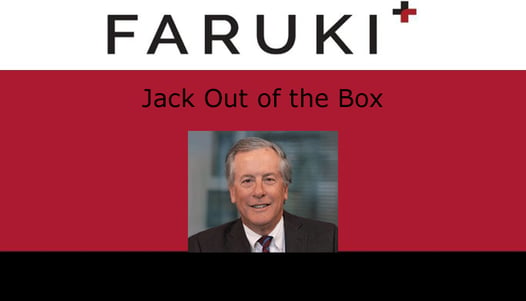- December 30, 2024
- Jack Greiner
- Jack Out of the Box
 A recent ethical decision from the United States Court of Appeals caught my eye because it exposes the tension between judicial ethics and the First Amendment. And being frank, it exposes some judicial thin skin. Not a good look.
A recent ethical decision from the United States Court of Appeals caught my eye because it exposes the tension between judicial ethics and the First Amendment. And being frank, it exposes some judicial thin skin. Not a good look.
On May 24, 2024. Judge Michael A. Ponsor, a federal judge for the District of Massachusetts, wrote an essay for the New York Times entitled "A Federal Judge Wonders: How Could Alito Have Been So Foolish?" In the essay, Judge Ponsor commented on Justice Alito flying an upside-down American flag and an "Appeal to Heaven" outside of two homes owned by Justice Alito.
Judge Ponsor was mainly concerned with the perception that Justice Alito's action created. Judge Ponsor correctly noted "[these flags are] viewed by a great many people as a banner of allegiance on partisan issues that are or could be before the court." The larger point is that the public shouldn't view a Judge – especially a Supreme Court Justice – as having a bias. Given the connection between the January 6 protestors and those flags, how could one not get that impression? Again, Judge Ponsor correctly notes, "Courts work because people trust judges. Taking sides in this way erodes that trust."
An unnamed complainant filed an ethical complaint against Judge Ponsor, contending that the essay was a "highly inappropriate, baseless, and prejudicial speech by a judge against another judge while he is deciding the legal fates of criminal defendants going through the judicial process." Perhaps the essay was "prejudicial" in that it criticized the Justice. But I have a hard time seeing how it's "baseless." Judge Ponsor didn't make up the facts, and Justice Alito never disputed them, other than to blame it on his wife. So, I guess the question is whether the essay was "inappropriate." Albert Diaz, the Chief Judge of the Fourth Circuit, concluded it was.
In Judge Diaz's view, "the essay expressed personal opinions on controversial public issues and criticized the ethics of a sitting Supreme Court justice." That much is true. But Judge Diaz went on to find that "[s]uch comments diminish the public confidence in the integrity and independence of the federal judiciary in violation of Canons 1 and 2A." Perhaps. But plenty of people have expressed concerns with Justice Alito's conduct. Did Judge Ponsor do anything other than hold up a mirror? in other words, did Judge Ponsor "diminish the public confidence" or did Justice Alito?
But perhaps more troubling than Judge Diaz's conclusion regarding Canons 1 and 2A is his finding that Judge Ponsor violated that Canon 3's prohibition on publicly commenting on the merits of a pending matter. Judge Diaz held "viewed in the timeframe during which the essay was published, including the substantial press coverage detailing the calls for Justice Alito's recusals from the then-pending January 6 cases, it would be reasonable for a member of the public to perceive the essay as a commentary on partisan issues and as a call for Justice Alito's recusal." In his New York Times piece, Judge Ponsor did not mention the January 6 cases at all. He never called for Justice Alito to recuse himself. He simply expressed his opinion that in failing to do so, he threatened the public's perception of the Court's integrity.
It's troubling enough that the Supreme Court operates under a toothless code of ethics. It is more troubling when a Federal Judge can be disciplined for merely pointing out a Justice's questionable judgment.
